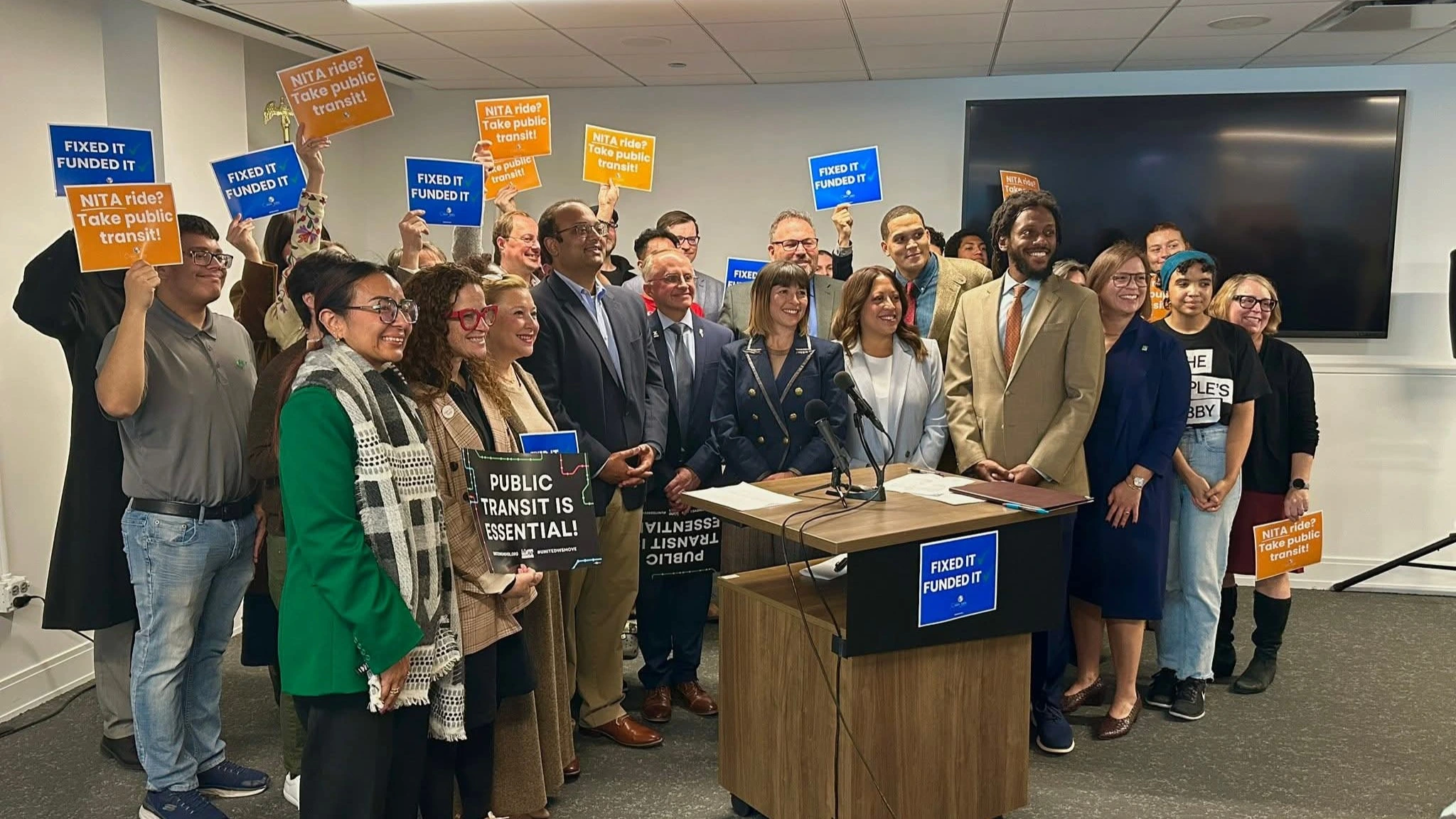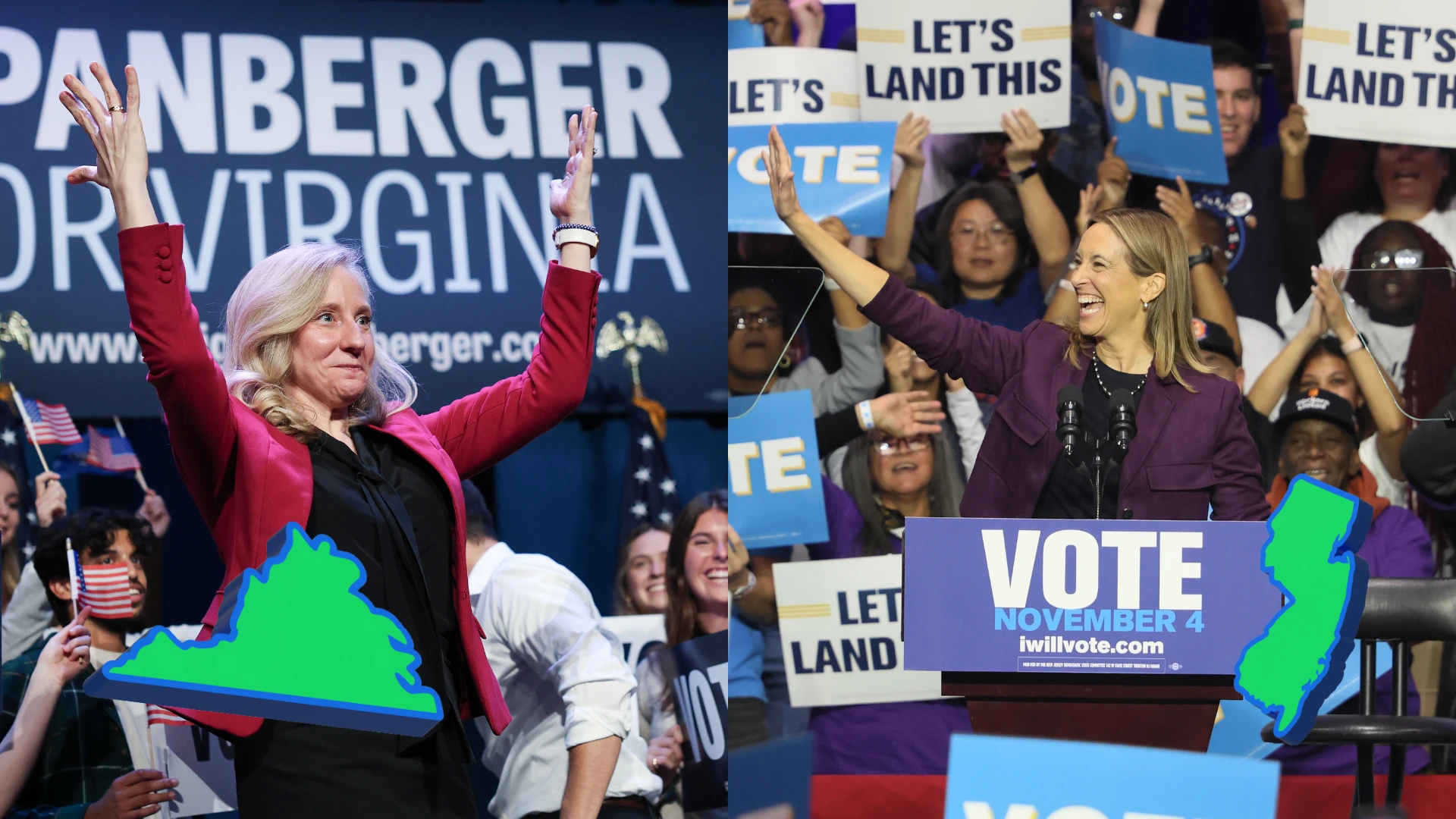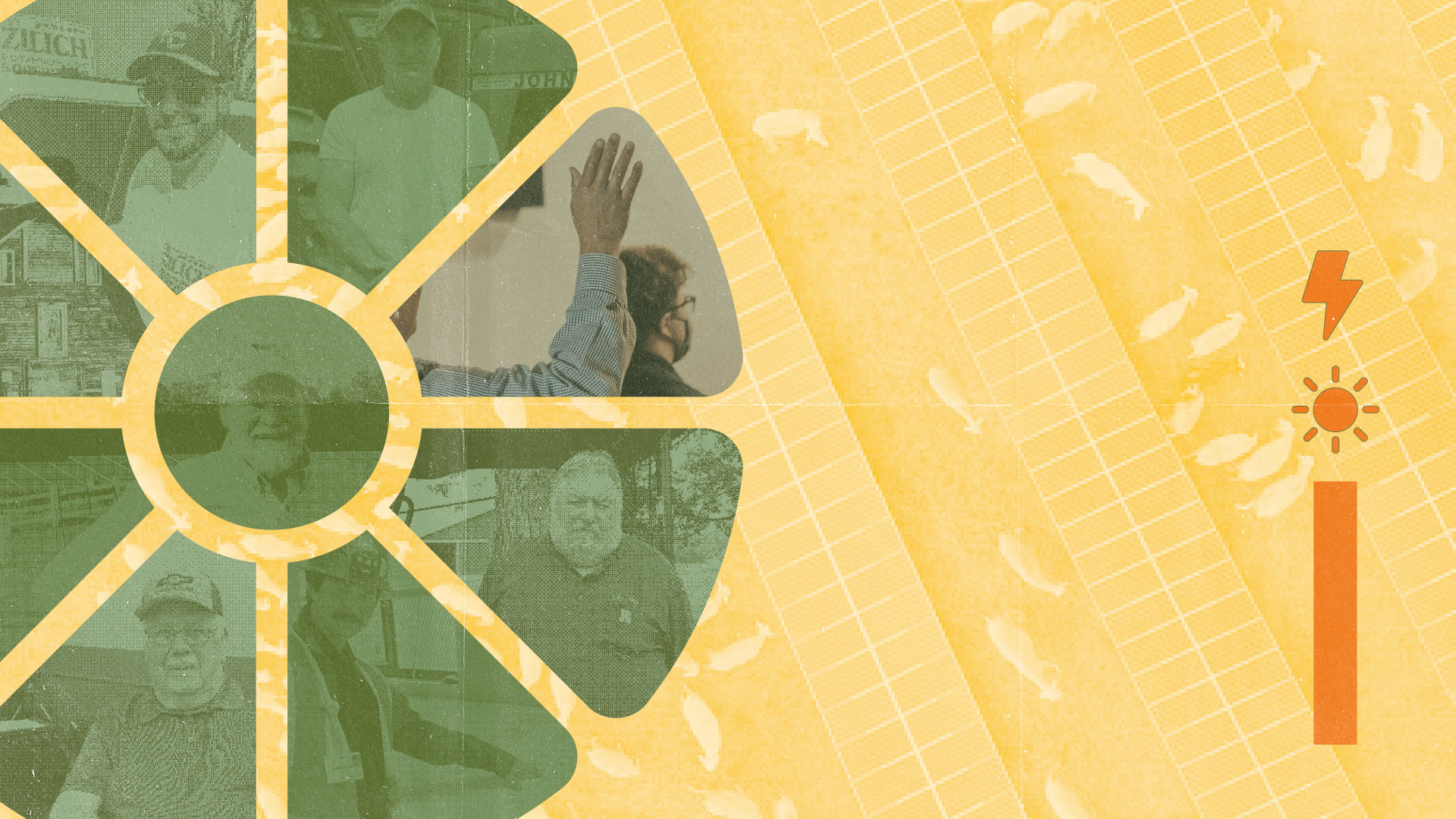

Listen to the highlights of this interview above or keep reading.
While clean energy was helping win elections in New Jersey, New York, Virginia, and Georgia, Illinois just showed us what’s possible when you elect clean energy leaders and work in coalition to pass bold, people-centered policies.
In a historic, down-to-the-wire victory, Illinois lawmakers passed two pieces of legislation: the Clean and Reliable Grid Act (CRWA) and Northern Illinois Transit Authority Act (NITA)—game-changers for affordability, improving public transit, and lowering energy bills.
These two bills include exciting, creative solutions to challenges being faced by communities across the country:
For answers to these questions and more, we spoke to Kady McFadden, the lead lobbyist and strategist with the Illinois Clean Jobs Coalition, and Amy Rynell, who co-leads the Clean and Equitable Transportation Campaign. These two advocates were instrumental in the passage of Illinois’ latest policies and expertly break down the bills, why they matter, and what the rest of us can learn from their successes.
Are you a policymaker or advocate? It’s time to take notes, and as Kady aptly advises, “strap in!” You can find the transcript of our conversation below, edited for brevity and clarity.
Evergreen: A lot of folks are thinking about rising energy costs and affordability right now. Could you share how Illinois' new bills will make a difference for households dealing with these challenges? And before fully diving in, can you give a brief overview of what’s in these bills?
Kady McFadden: Absolutely. We're really excited to have been able to pass the Clean and Reliable Grid Affordability Act. In developing this legislation with a coalition of climate advocates, but also consumer advocates, ratepayer advocates, environmental justice communities, and faith communities, we were really recognizing the threat of rising utility bills years ago, especially because of high capacity payments.
We need to make sure that we're building enough clean energy because we have a supply and demand problem. We need more supply of clean energy on the grid, and that's the best way to combat these rising energy prices.
Energy policies in the package, first off, include a huge investment in battery storage, which is not something that Illinois had targets around to date. This bill is going to procure three gigawatts of battery storage by 2030. And maybe you and I understand how that is a ratepayer concept and directly gets to the heart of the capacity shortfalls. But it does take some explaining to lawmakers to really understand that! Battery storage is a huge step in making sure rates don't rise any further and in having a cleaner energy grid.
It is a thousand-page bill, so I won't go through everything, I promise, but something we're really excited to shout from the rooftops is the state Integrated Resource Planning Process (IRP), which sounds kind of nerdy but is extremely important.
We're going to be the first deregulated market to have this state IRP process, so that we don't have to wait until people's bills go up to figure out what is the most cost-effective way to bring energy to the state. And we believe that is always going to be clean energy investments. Having this IRP process is going to help us reach our 100 percent clean energy future through regulatory processes.
In general, all of this is going to address a supply and demand problem. We need to build more clean energy. This bill is projected to build at least 17 GW of clean energy, more clean energy on top of our existing clean energy commitments. To bring down costs, that's just what we need. We need to build.
The estimates from the Illinois Power Agency are that in northern Illinois, folks will start saving $2/month on their bills starting in 2030, and in central and southern Illinois, that will be $10/month. That's in 2030, and it goes up from there.
Amy Rynell: If you look at the data in Illinois, in large part because of the progress we've made on clean energy in Illinois, greenhouse gas pollution from transportation is our number one source of pollution. It is the only sector that's getting worse in Illinois. Since COVID, especially, we've seen people relying on vehicular travel a lot more. And that's been hurting our communities in different ways.
When we looked at the climate impacts of transportation and the suite of policy solutions available, a cornerstone of that is public transportation. So we began working with the coalition and many others to look at what's possible. At the same time, our transit system was heading towards a fiscal cliff [a budget shortfall that could have caused service cuts and fare hikes], not unlike that of other urban areas, what they're calling “legacy transit systems.” So, we worked with many different types of stakeholders over the last three years to build a plan of action for transit.
It had a tremendous amount of input and a tremendous amount of good policy thought to it. For our state's well-being and our community's well-being, we need more transportation options that are climate-friendly and robust.
The [$1.5 billion] funding investment addresses the transit fiscal cliff, but it then makes really critical investments in the things we need to be doing to get more riders and to build the system of the future and make it more resilient. From the perspective of riders and especially people who don't drive, who can't afford a car, our youth, our seniors, households with low incomes, people with a disability, this is their transportation mode, and we have just made it exponentially better. And that keeps our city affordable. It is just tremendous what it does to folks’ pocketbooks.
Evergreen: These are huge wins, and a lot of other states are in similar situations. For others looking to follow your lead, what went on behind the scenes that you think allowed you to be successful?
Amy Rynell: It was a very robust inside game and outside game. The coalition is really strong. We had to make a lot of hard decisions together in the final days of session. We meet all the time to keep everybody abreast of the moving parts. And as a result, everyone was really bought in. People contributed in ways that I don't even have words for. It was really tremendous.
We met with our legislative champions every week for a couple of years. Because this is complex policy, we needed to be working from the same playbook, understand why decisions were being made, and help them make the case better. That's a lot of meetings and conversations to stay on the same page, moving something so complex.
Maybe the biggest win on the climate side, in addition to being able to grow and improve transit, is the way we're funding it. It’s by taking the sales tax from motor fuel purchases and directing that into transit operations. And that's just a tremendous climate shift. That will have lasting impacts in other ways and begins to recognize the impact of driving in the role that transit plays. So, we're really excited about that move and hope that other states can follow.
Kady McFadden: I think one thing our coalition did that I'm really proud of is we had teams of experts for each of those topics—everything from battery storage policy to property evaluation to siting to integrated resource planning to energy efficiency. Sure, I'm the one interfacing with the legislators in the working group, but depending on the topic, I'm bringing in amazing experts.
It also grew and diversified our movement. It wasn't only me or a couple of us in the negotiations. It was so many of us from the team, and for some of them, this was their first bill, or they were younger and newer to this policy space. It helped us grow the bench in a place that I know we're going to see results for years to come. There was also some unique lawmaker education that needed to happen. These things can be complicated, and so ensuring that we had the ramp to explain how capacity markets work to over 100 legislators is a big task. But you need to understand the basics to understand why we were proposing certain policies.
The final piece I'll say is that organized labor, especially in a blue state like Illinois, on an energy bill, is a really important stakeholder. Sometimes we agree, and sometimes we don't. I think a key piece of making that work and ensuring that we get both parties to be supporters of the bill, so that we can ultimately pass it, is to really deeply understand what their interests are and what they're trying to do.
Sometimes, it's not always what you might guess, but if you can spend enough time establishing relationships and understanding the problems and underlying interests, you can unlock a door and move forward.
It's hard to talk about these achievements without talking about the significance of our governor. Governor J.B. Pritzker, his office, and his staff are pretty directly involved in these negotiations and this policy development. It is really just tremendous to get to work in a state where you know that the governor has your back, is ready to fight for the same policies that you want to see, and is going to be on your side even if there might be more powerful special interests on the other side. Amy and I couldn't do what we do in quite the same way without having that leadership.
Evergreen: Is there a part of these bills that you’re really proud of or stand out to you that folks might not know about, or that you don’t think is getting enough attention?
Amy Rynell: There are a couple of things in there that are really important for getting at the intersection of climate and transportation. And a key piece of that is something called transit-oriented development, or enabling development around transit stations and bus hubs so more affordable housing, walkable businesses, and community amenities can be built.
We've unlocked potential across our state for development around transit that is high value and high return, so we're really excited about that. Included in that—and it’s the wonkiest thing, but it's really, really important—is that we're removing parking minimum mandates around transit stations and routes that have held developers back from being able to develop things because they have to build so much parking. It's really important to make the ripple-effect benefits of transit realized.
The other things we're doing are making our system easier to use, unifying the fares, and using one app. It's a mess. And if you come to Chicago and want to only use transit, and you need to go farther out than the city center, it gets complicated fast. And it shouldn't. So, fixing these problems is something people are really excited about.
Kady McFadden: I have a couple of small things hidden in our thousand-page bill that I'd love to quickly tell you.
Municipal utilities and co-ops have been largely excluded from our energy policy in Illinois, and that is no longer the case. They are also going to have to do their own Integrated Resource Plans that actually model out how they'd hit our clean energy goals—which is just huge. Huge swaths of the state may now be open to clean energy development. We're really excited about that.
We're going to be piloting thermal energy networks in this state, as well as a new geothermal program for homes and businesses. Residential and business geothermal has not been as big a market in Illinois, but now we're going to be prioritizing that, which I think is going to deliver savings across the state.
Evergreen: Lastly, do you have words of advice to fellow climate, clean energy, and transportation advocates to keep them hopeful in their own work?
Amy Rynell: In the words of a famous Chicagoan, an architect named Daniel Burnham, who has an imprint around our city, “Make no little plans.” You have to make a decision to go all in.
We were holding breakfast briefings three years ago, handing out cookies with bus stop signs that said “save transit.” And we ended with buttons for everyone voting yes. I love transit, and that's a three-year journey from saving something to making it great. We used a policy window to do that, but that's a long time to keep a policy window alive.
Kady McFadden: Our fight to pass CRGA was many years long. We wrote it in response to capacity market spikes in one ISO [Independent System Operator] and then ended up passing it in response to capacity market spikes in another three years later.
To my fellow activists, I would say, strap in! Some of these fights take a while, but you're building each year even when it maybe doesn't feel like it. Lawmaker education builds on itself, and then when there's a window to get it done, you can run right through it!
Evergreen: What I'm hearing is circular objects, in particular, make for very good strategy—whether that’s cookies or buttons! Thanks again for your time and insights, and congratulations again on this huge achievement!

Medhini is the writing/editing digital lead for Evergreen. Through powerful storytelling, she hopes to help move the needle on climate policy and contribute to our collective fight for a livable planet.


